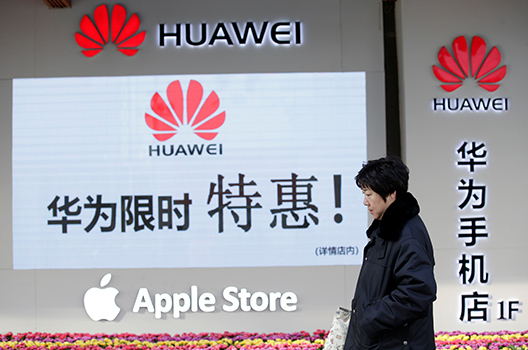The charges announced by the US Department of Justice against Chinese telecom giant Huawei, “stand on their merits” but are “difficult to view. . . in isolation” from the Trump administration’s strategy to get Beijing to undertake meaningful economic reform, according to Robert A. Manning, a senior fellow in the Atlantic Council’s Scowcroft Center for Strategy and Security.
The US Justice Department detailed thirteen charges against Huawei, its affiliated firms, and its chief financial officer Meng Wanzhou on January 28. Meng has been in Canada since being detained on December 1 at the request of the United States for allegedly violating US sanctions on Iran. Acting US Attorney General Matthew Whitaker confirmed that the United States would formally file an extradition request to bring Meng to the United States by January 29.
In addition to the charges related to Iran sanctions, US authorities are also alleging that Huawei and its subsidiaries engaged in bank fraud, wire fraud, obstruction of justice, and stole smart phone technology from mobile communications company T-Mobile.
In a statement announcing the charges against Huawei, Whitaker said “China must hold its citizens and Chinese companies accountable for complying with the law.”
The Huawei announcement comes as the United States is expecting to host a Chinese delegation for further trade talks in Washington on January 30 and 31. The Trump administration has frequently demanded that Beijing curb its unfair trading practices, including intellectual property theft, forced technology transfer, and state-supported subsidies. In a wide-ranging speech criticizing Chinese policy, US Vice President Mike Pence said on October 4 that China’s policies “have built Beijing’s manufacturing base, at the expense of its competitors – especially America.”
Atlantic Council President and CEO Frederick Kempe wrote in December that the targeting of Huawei by US authorities was a sign of the “accelerating tech arms race” between China and the United States. “This is a struggle that will play out for years to come, with unpredictable outcomes, across security, trade, investment, and cyber domains,” he argued. “The most significant test, however, and one that could determine who takes the global commanding heights, will be over matters such as 5G communication, artificial intelligence, and quantum computing.”
In an effort to get Beijing to the bargaining table and end the damaging practices of forced technology transfer and intellectual property theft, the Trump administration last year placed tariffs on $50 billion worth of Chinese goods in June and additional tariffs on another $200 billion worth of goods in September. Both actions were met with retaliatory tariffs by Beijing. Earlier this month, both Beijing and Washington had expressed hope that a comprehensive deal could be reached to end the trade war between both sides. US President Donald Trump said on January 6 that, after speaking with Chinese President Xi Jinping, it was clear that the Chinese “want to make a deal. The tariffs have absolutely hurt China very badly.”
The new pressure on Huawei, however, could derail this new momentum in talks. Manning pointed out that unilateral measures are not the only options available to Washington to change Chinese behavior. “This is not merely a US effort,” he said. “The United States, the European Union, and Japan share similar grievances against China’s industrial policy practices and are cooperating in the World Trade Organization to press for change.”
In remarks to the Atlantic Council on January 9, European Union Commissioner for Trade Cecilia Malmström said Europe and Japan recognized the “need to update the [trade] rules to face this century’s realities. Particularly unfair trading practices from China – like forced technology transfer and state subsidies.”
While US Department of Justice authorities maintain that the actions were not connected to US trade policy, the ramifications will likely be felt this week as both sides look to end the trade impasse. In a January 9 op-ed, the Chinese ambassador to Canada criticized Canadian authorities for cooperating with US authorities in detaining Meng. “The rule of law is nothing but a tool for their political ends,” he wrote, adding “what they have been doing is not showing respect for the rule of law, but mocking and trampling the rule of law.”
The question will now be whether the negotiations in Washington can be continued, or whether this latest development in the US-Chinese feud will knock the train off the tracks.
David A. Wemer is assistant director, editorial at the Atlantic Council. Follow him on Twitter @DavidAWemer.
Image: A woman walks past a Huawei and Apple shops in Beijing, China December 12, 2018. (REUTERS/Jason Lee)
